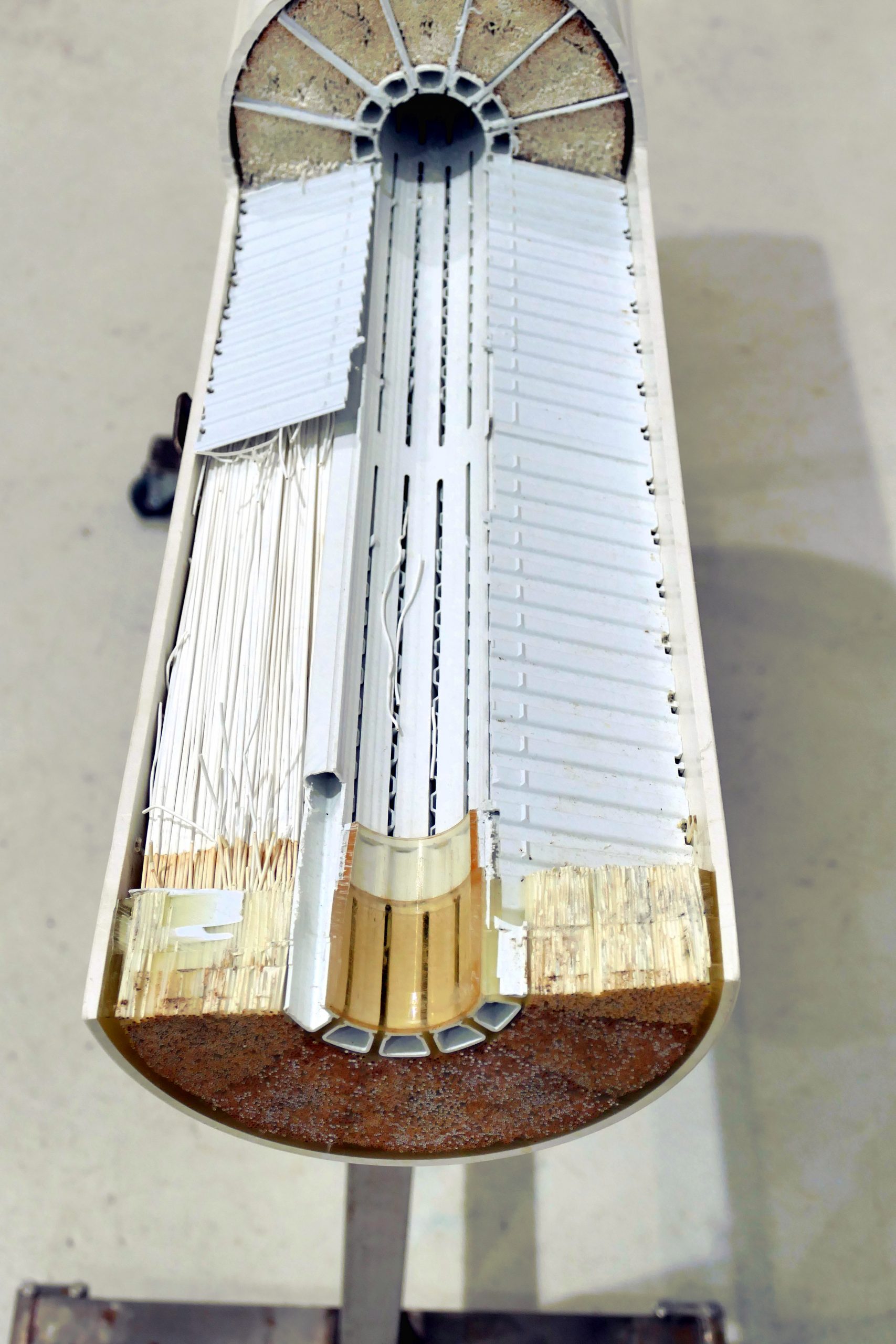
Partner Program with Membrane Works
All membrane systems experience a deterioration in performance from time to time. Typical problems that you might see include;
- a drop in salt rejection
- increased trans-membrane pressure
- high pressure drops in a module
- a decrease in product water volume
- an increasing frequency of cleaning
However, using performance data only, it can be impossible to determine exactly what is causing a problem. A membrane autopsy can be a vital tool in identifying the causes of these problems. Autopsies are often also conducted at the end of membrane trials or prior to replacement to study the long-term effects of your cleaning process or in the event of a system incident of event.
A membrane autopsy typically involves the removal or one or more membrane modules from your system which then undergoes a series of destructive testing. Testing is conducted on both the membrane material and also any fouling material that is removed from the surface, with the ultimate aim of the process to determine the root cause of the fouling or membrane failure and to provide actionable recommendations to correct to manage it.
Autopsy Analytical Services can include;
- Visual Inspection of the internal and external membrane components for mechanical damage
- Characterisation of inorganic scale and fouling deposits
- Characterisation of organic contaminants such as oils and soil or plant products
- Microscopic membrane surface inspection using electron microscopes
- Testing for oxidative damage
- Biological testing to identify bacterial or microbiological contamination
- Membrane integrity (dye leak) tests
- Different performance or cleaning testing
Independent
- Independent results you can trust
- No affiliations with specific vendors or products
Comprehensive
- In-depth wet chemical and analytical test capabilities
- Performance testing including benchmark performance testing, cleaning studies, lab biocide/scale control studies, dye penetration testing
- Access to the best analytical tools in the market place through university partner programs
Expert
- Experience scientists and engineers with broad based industry experiences
- Works class modelling and performance software
Benefits
- Maximize water production
- Reduce treatment and maintenance cost
- Solve operational issues
What is a Membrane Works Partner Program
WaterIQ have a partnership agreement with Membrane Works to conduct membrane autopsy work. For more details on this and the benefits, please contact us.
Do you provide membrane treatment products or membrane modules?
At WaterIQ we pride ourselves on being able to provide expert independent advice, as such we don’t represent any particular supplier. However, at your request we can work with different suppliers to get product samples or support in-field validation if that’s required.
Why would we need independant verification?
There are times when its critical to have independent and trustworthy advice on which to make your decisions. After all, once selected you will likely be working with a supplier for many years. Let’s make sure it’s the right one!
What should we expect from a membrane autopsy?
Our membrane autopsies are designed to generate a list of actionable insights to help you improve your membrane treatment life in the future. Initially we will start the autopsy based on interviews with your team and the knows problems that you are trying to solve. This first involves opening and physical inspection of the membrane module. We then conduct a series of analytical tests designed to identify the root-cause of the membrane failure. The test program is adapted based on what we find once we open the membrane but would typically include:
- Identification of scale and inorganic deposits
- Identification of organic oils and foulants
- Inspection of the membrane surface using electron microscopy
- Cultured micro biomaterial testing to identify bacterial and other biological contaminants
- Testing for oxidative degradation
- Feed and produced water testing
However, we may need to look further to identify the problems including:
- Mechanical strength testing
- Membrane integrity (dye testing)
- Dead end flat sheet performance testing
- Particle size testing
If you have specific needs then please contact us and we can find the right testing program for you
How should membranes be prepared for autopsy?
Ideally membranes shipped to Membrane Works as quickly as possible after removal from the plant to minimise changes. The membrane should be stood on its end for 30-60 minutes to allow the water to train from it and then it should be sealed in a sturdy plastic bag to prevent drying and stored in a cool dark location prior to shipment. Biocides and other preservatives should not be added.
What membranes do you recomend conducting autopsies on?
We recommend at least 2 membranes be tested during an autopsy. The lead membrane in the array will experience the highest flux rate and be exposed to the most contamination material and thus is likely to show the most mechanical and organic deposition. The tail membrane in the array will be exposed to the highest concentration of water and thus have the highest likelihood of having scale and inorganic fouling.
When should we conduct a membrane autopsy?
The most common times and reasons for conducting a membrane autopsy include:
- End-of-life to look for systematic problems that may have occurred over the membrane’s life time
- Post-trial – if your conducting a membrane or treatment trial, often it’s important to see if any problems are developing on the membrane surface that are not apparent in the operational data. This will help prevent unseen problems from developing in the future
- Troubleshooting – one of the most common reasons to conduct an autopsy is to solve a problem that is being experienced in the plant. Being able to see what is really happening at the membrane surface is critical to solving these problems
Why choose WaterIQ?
WaterIQ combines a unique mix of local and global experiences coupled with a strong scientific background and commercial expertise in its consulting services. This allows us to bring you insights that can truly be called Smart Water Solutions

